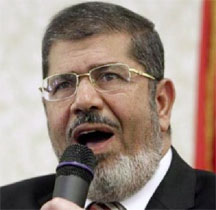CAIRO, (Reuters) – President Mohamed Mursi offered opponents a say yesterday in amending a controversial new constitution and a forum to seek “national reconciliation”, as he sought to avert a violent showdown in the streets.

In a televised address lasting more than two and a half hours, the Islamist head of state blamed loyalists of fallen dictator Hosni Mubarak for the “paralysis” that has marked his first year in office but also offered an olive branch to opponents that also seemed to address demands from the army.
He said he was inviting party leaders to meet today to choose a chairman for an all-party committee that would prepare amendments to the constitution. It was pushed through a referendum late last year with Islamist support, but many in the opposition say the document is flawed and biased against them.
Mursi also said he was forming a committee of leading public figures, including Muslim and Christian clerics, to promote “national reconciliation”.
“I say to the opposition, the road to change is clear,” Mursi said, pointing to parliamentary elections expected later this year. “Our hands are extended.”
The head of the armed forces warned this week that the military could step back in if politicians failed to end the polarised deadlock that has caused violence in the streets – including two deaths and scores of injuries yesterday.
Liberal opponents are hoping millions heed a call to rally on Sunday, the first anniversary of Mursi’s inauguration, to demand he step down. Islamists have also been putting on shows of strength and plan another major demonstration on Friday.
Mursi called for calm: “I say to all those planning to take to the streets to keep the protests peaceful and not be dragged into violence as violence will only lead to violence. Protests are a way of expressing an opinion – not imposing one”.
ENEMIES
Earlier in his speech, Mursi admitted errors and offered reform but was otherwise uncompromising in his denunciation of those he blamed – some by name – for wanting to “turn the clock back” to before the 2011 revolution against Mubarak.
Interrupted by occasional cheers from Islamist supporters, Mursi told an audience that also included the head of the army that many of the difficulties of his first year in office were due to the continued influence of corrupt Mubarak-era officials.
“I took responsibility for a country mired in corruption and was faced with a war to make me fail,” he said, naming some senior officials, including the man he beat in last year’s presidential run-off, as well as neighbourhood “thugs”. He also slammed some owners of hostile media, accusing one of tax fraud.





